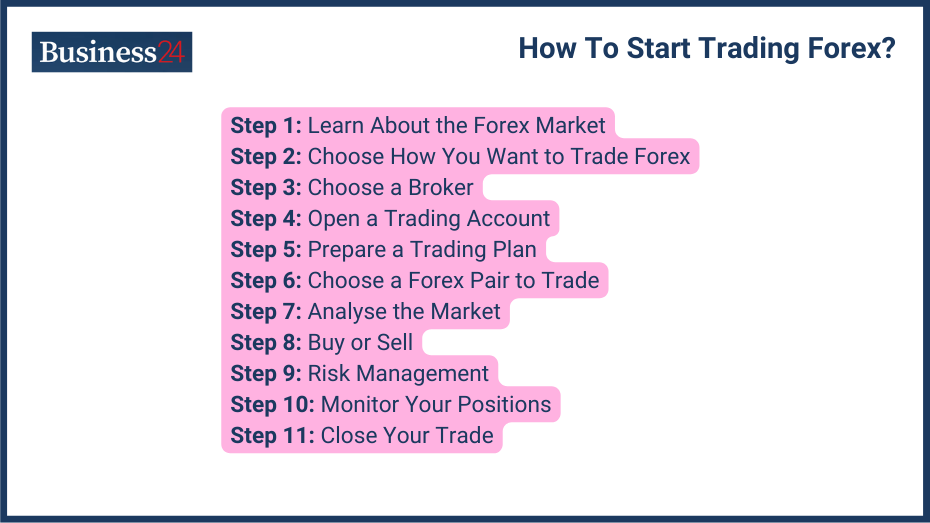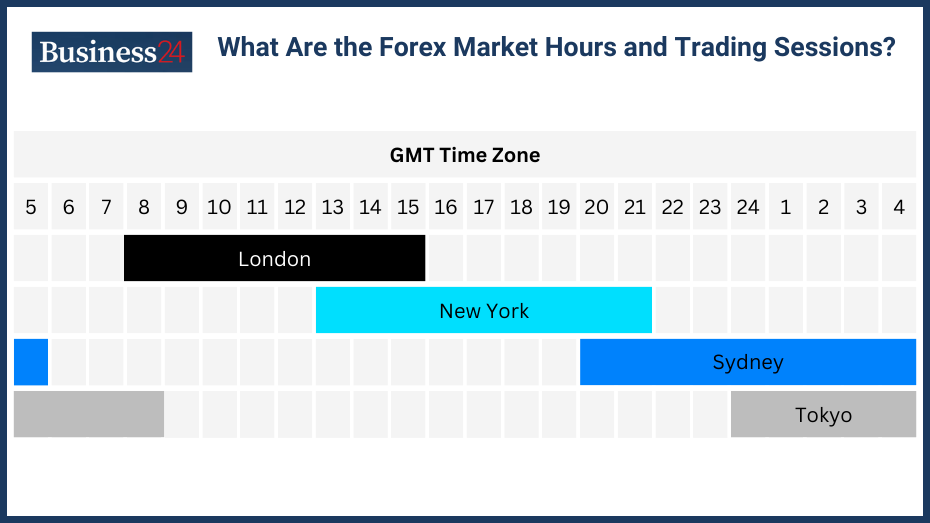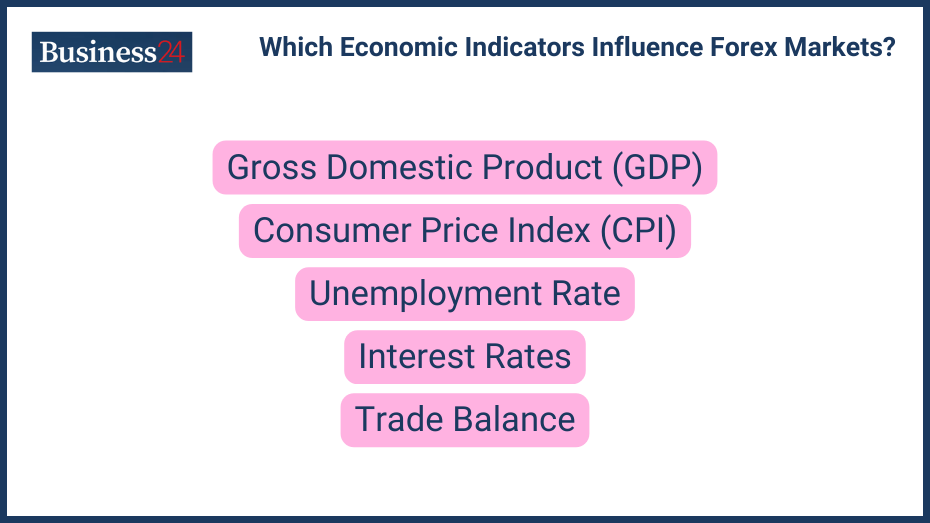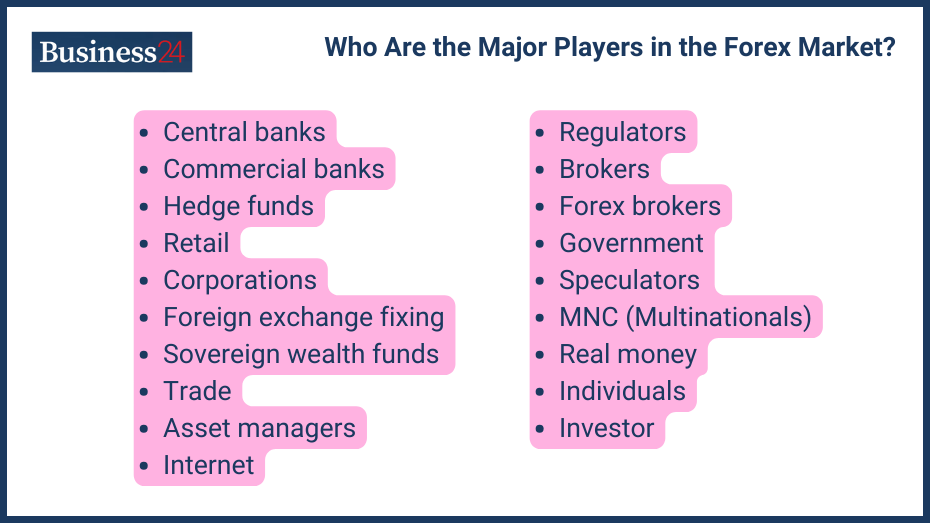
Foreign exchange (forex) trading involves buying one currency while selling another, aiming to profit from the transaction. Forex (FX) is a blend of the words “foreign” and “exchange.” According to a 2022 triennial report by the Bank for International Settlements, which serves as a global bank for national central banks, the daily global volume for forex trading reached $7.5 trillion in 2022.
What is Forex Trading for Beginners?
Forex trading, or foreign exchange trading, is the process of buying and selling currencies to make a profit, tailored for beginners. Gone are the days when Forex trading was heavily dominated by institutional players like banks. Now, the market is much more democratized with retail investors proving themselves too.
However, beginners need to understand the intricacies involved in the Forex market before investing in it. Forex is decentralized and therefore, it is prone to scams and other methods of cheating. A major chunk of Forex is now electronically traded while actual banknotes and legacy currency changers only represent a small section of the market.
How Do You Understand Forex Trading Mechanics?
Forex trading mechanics involve exchanging one currency for another based on market conditions. While the basic premise of the Forex market is simple enough, its trading mechanics need some in-depth understanding.
At the heart of the Forex trading market are the currency pairs. A currency pair is the value of one currency relative to another. The currency with the higher value is generally the base currency and is in the numerator, while the one with the lower value is usually in the denominator and is called the quote currency.
You can either go long or short in Forex. When you go long, you buy the currency pair at the spot price in hopes of an appreciation in the near future. When you go short, you sell the currency pair at the spot price in hopes of an incoming depreciation that will benefit you.
Every trading pair has a buying price (quote) and a selling price (bid). The difference between these two values is the margin for the Forex trader, aka spread. It is measured in pips, which is valued at 0.0001.
What Are the Forex Market Hours and Best Times to Trade?

The Forex market operates 24/5, with the best times to trade being when major financial centers are active. It holds a unique position in the global markets because of its decentralized nature and unique session.
Major Trading Sessions
Four major Forex trading sessions are held in New York, London, Sydney, and Tokyo. However, some analysts believe that the major chunk of the trading activity is in London, New York, and Tokyo alone. Timing hours:
New York: (13:00 GMT to 22:00 GMT)
London: (07:00 GMT to 16:00 GMT)
Tokyo: (00:00 GMT to 08:00 GMT)
Optimal Trading Hours
Forex trading activity is at its highest when two or sometimes more major trading sessions overlap with each other. It also gets the most volatile and market action during this time.
High volatility sessions include:
New York-London Overlap during 13:00-17:00 hours. This overlaps two of the largest forex markets, so naturally, it comes with increased volatility.
Medium volatility sessions include:
Tokyo-Sydney Overlap during 05:00-07:00 hours: This overlap isn’t as dramatic because these are smaller markets overall.
What Are the Top Economic Indicators for New Forex Traders?

Key economic indicators such as interest rates, inflation, and employment data significantly impact Forex markets, crucial for beginners to understand. Each of them impact the market in a unique way.
Interest Rates
The central bank determines interest rates in the country. These usury rates have a direct impact on the demand for the local currency as investors are incentivized to hold it for a longer period of time if they are high enough.
Inflation Rates
High inflation rates result in increased demand for the underlying national currency. This is because the longer the investors have to hold it, the less value it brings to the table.
Employment Data
Employment statistics are shared by the labor department of a country. They have a significant impact on the Forex value of the national currency. Higher employment rates mean increasing confidence in running of the affairs of the state and vice versa.
Who are the key players in the Forex market?

Major players in the Forex market include central banks, financial institutions, corporations, and individual traders. Their collective approach determines the outlook of the currency’s standing in Forex trading.
Central Banks
The central bank’s primary role in the Forex market is the determination of interest rates. A high interest rate is appealing for Forex investors as it allows them to accrue value over time passively.
Financial Institutions
Big financial players like banks are direct players in the Forex market, often providing updated buying (quote) and selling (bid) prices for retail buyers. Banks also provide extended liquidity in the market so that the volatility is kept in check.
Individual Traders
Individual or retail Forex traders are now collectively one of the big players in the Forex markets. Previously, they had to operate through other financial institutions, but with the rise of electronic trading desks, they wield considerable influence. They hold a major chunk of the $6 trillion+ daily Forex transactions.
Why Should New Traders Trade Forex?
Forex trading offers high liquidity, 24-hour market access, and the potential for substantial profits, making it attractive for new traders. Forex trading has these unique characteristics that are hard to find in other markets.
High Liquidity
The Forex market has the highest liquidity of any other global trading activity. With high liquidity comes lower spreads, which actually makes the market very stable compared to stocks and commodities.
24-Hour Market Access
The Forex market operates on a 24/5 model meaning it is open 24 hours a day and 5 days a week with weekends off. This consistent access keeps the Forex market stable and reliable for investors.
Profit Potential
The Forex market’s spread is quite small and therefore profit margins are tight. However, these smaller profits are offset by the high liquidity of the market which means there are still a lot of profits to be made.
What Are Basic Currency Correlations and Why Are They Important?
Currency correlations help traders understand the relationships between different currency pairs, which is crucial for managing risks and identifying opportunities. Understanding this basic correlation science can help Forex traders become more efficient.
Positive and Negative Correlations
Following correlations between currencies can exist:
Positive correlations: Several currencies tend to post similar trends against a base currency. The Swiss Franc (CHF) and GB Pound (GBP) often post similar correlations against the USD due to their status as a safe investment. When market is booming they come down in value and when market is tough, they go up in value.
Negative Correlations:
Negative correlations is when currencies tend to post opposite trends relative to each other. The US Dollar and Japanese Yen generally post opposing trends to each other.
Using Correlations in Trading Strategies
You can use the knowledge of correlations between currencies and currency pairs to your advantage:
Hedging: Negative correlations are often used in hedging. Two currencies with negative correlations can be invested in. Losses in one can be offset by the other.
News Analysis: Positive correlation can be used by analyzing news and betting on the strength and weakness of the base currency, which is often the US Dollar.
What Are Simple Risk Management Techniques for New Traders?
Effective risk management techniques, such as stop-loss orders and position sizing, are crucial for new Forex traders.
Stop-Loss Orders
Some forex trading pairs are more volatile than others. You can certainly invest in them, but you will need to offset losses by employing a stop-loss trade option. Basically, if the price drops below a certain pre-set level, your position is immediately liquidated, thus saving you from the downward price action.
However, stop-loss orders need to be done with professional calculations otherwise you will keep losing money with minor price fluctuations.
Position Sizing
Position sizing is allocating a certain portion of your portfolio in individual trades and not overstretching your exposure to the market. It is important to keep the trading lots spread out and not concentrate on one trading pair.
How Do Psychological Challenges Affect Forex Trading?
Psychological factors play a significant role in trading decisions, impacting how new traders react to market movements. You need to know more about them to engage in effective, profitable Forex trading.
Emotional Trading
Emotions play a major role, especially when it comes to individual or retail traders. The primary ones are fear and Greed. So much so that there are fear and greed indices to help anticipate the market’s emotional positioning, but it is not an exact science.
Other emotional challenges include overconfident trading or all-in or nothing approach and revenge trading. All of these emotional challenges are real and they can cut into your profits or even result in losses.
Developing a Trading Discipline
With Forex trading, the more you know, the less your psychological situation can impact you. To develop a robust trading discipline, you need to:
- Chalk out a trading plan
- Be aware of the news cycle
- Study your own emotional triggers
- Maintain a trading log to reflect on your prior handling
- Set realistic profit expectations to protect yourself from scams
How Can You Get Started with Forex Trading?
Starting Forex trading involves learning market fundamentals, choosing a broker, and developing a trading plan. Each of these steps is important before you can start trading in the market.
Choosing the Right Forex Broker
Choosing the right Fsisorex broker is important for your trading goals. Aspects you need to keep in mind include:
- Regulatory approval
- Client history and testimonials
- Fee structure
- Previous challenges
- Trading pairs availability
- Working hours
Developing a Trading Plan
A robust trading plan has the following key components:
- Risk Tolerance Calculation and Mitigation: You need to calculate the types of risks involved and try to mitigate them with stop-loss trades or position sizing.
- Entry and Exit Strategy: A sturdy trading plan has an effective entry and exit strategy. You need to have pre-set goals for a particular time and have an exit strategy that minimizes losses and maximizes gains.
- Fundamental and Technical Analysis: You need to undertake effective fundamental and technical analysis to predict the future of the market. You can then trade accordingly.
- Time Commitments: Forex trading can be a side hustle, but it has certain time requirements. If you aren’t able to meet them, you will miss out on opportunities and fail to cash out on time.
What Essential Definitions Should You Know About Forex Trading?
What is the definition of a Currency Pair?
A currency pair is the relative value of one currency over another, such as EUR/USD, USD/CAD, GBP/USD, etc. The currency with historically higher unit value is in the numerator, and the one in the denominator is the historically smaller unit value.
What is the definition of Leverage in Forex?
Leverage is when you magnify your presence in the market by borrowing from the broker. It is a risky enterprise and needs to be done with caution. You can go 2x, 5x up to 100x.
What is the definition of a Pip?
A pip is the smallest unit in currency pairs, and its value is 1% of 1% or 0.0001. If EUR/USD moves from 1.1000 to 1.1001, the spread or difference is one pip.
What is the definition of Spread in Forex?
The spread is the difference between buying (quote) and selling (bid) price of a Forex trading pair. It is essentially the retail currency dealer’s commission.
What is the definition of a Forex Broker?
A Forex broker is a platform that allows currency holders to engage with the Forex market. Brokers also provide a range of services that help the Forex trade including margin trade services.
What is the definition of Margin in Forex?
Margin is the value you deposit when you want to exponentially increase your exposure to the Forex market through leverage. You can go
What is the definition of a Lot in Forex trading?
The trading size is called a lot and it means the amount of currency being traded in a tranaction. Normal lot is 100,000 units and it goes down from there.
What is the definition of Technical Analysis in Forex?
Technical analysis is the use of charts and technical indicators to have a better understanding of the market dynamics.
What is the definition of Fundamental Analysis in Forex?
Fundamentals analysis is when you analyze related new developments to have a better understanding of the Forex market.
What Are the Most Common Questions Beginners Have About Forex Trading?
How does forex make you money?
There are several ways in which Forex Traders can make money. They include:
Making money speculating on the market
Making money from the spread of currency pairs. Some pairs have high spreads, but they are also much more volatile.
What is forex vs stocks?
Forex is the trade of currencies with to make a profit while stocks is the trade of securities and Exchange Traded Funds (ETFs) on centralized exchanges. Both of them have their unique upsides and downsides as Forex is more stable and liquid.
Is forex good for beginners?
Forex is suitable for beginners, but they need to do some research before dipping their toes in the market. It is important to start small and learn before taking the next step.
Is forex riskier than stocks?
Forex is less volatile than stocks but it is also much more liquid. However, Forex has a lot more scams than stocks so traders still need to be careful.
How do I turn $100 into $1000 in forex?
You can engage engage in leverage or margin trading to magnify your trading exposure but it comes with serious risks including negative trading balance at the end of the day.
Is forex gambling?
Forex is sometimes compared to gambling and there are certain similarities but stark differences are present including lack of fixed chance, influence of news and outside world, technical analysis and skill/expertise.
Can forex make you a millionaire?
If undertaken professionally, Forex trading can make you a millionaire. However, to do so, you need to work hard, prepare yourself, and craft revolutionary trading plans.
What Tools and Resources Are Essential for Forex Trading?
Utilize various tools and resources such as trading platforms, educational websites, and financial news sources to enhance your trading skills. You need to follow them to have a better grasp of the Forex market.
Trading Platforms
Meta Trader 4 and 5: MT 4 is the predecessor but it is still popular in certain circles. MT5 comes with built-in hedging capabilities and has a more modern interface.
TradingView: TradingView is perhaps the most popular analytical tool for traders of all backgrounds. It offers integration with some Forex brokers, so you don’t need to leave the platform to be able to do it.
FxPro: It offers CTrader and MT5 integration with fast speed and tighter spreads.
ZuluTrade: This platform is best for copying the trades of successful traders. It is a good option for beginners.
CTrader: It offers a more streamlined trading interface compared to MT5, which focuses on automated trading.
Educational Resources
Useful educational resources for Forex trading include:
Beginners can start with guides on Investopedia and DailyFx.
Follow subreddit r/Forex
Study courses on Coursera and Udemy
News Sources
Recommended news sources for Forex-related developments include:
- DailyFx
- The Economic Times
- Bloomberg
- CNBC
How Do You Place Your First Forex Trade?
Follow this guide to place your first Forex trade, from opening a trading account to executing your first order.
Opening a Trading Account
Follow these steps to open a trading account:
- Visit the trusted website and click on Signup/Registration
- Fill out the form, personal details and financial information
- Engage in KYC/AML verification, aka identity verification
- Download the trading platform if required
- Fund your account using your bank details
Executing a Trade
To execute your first Forex trading, follow these steps:
- Go to the trading desk
- Select trading pair like EUR/USD or USD/JPY
- Select trading lot
- Enter desired buying/selling value and execute a trade
- It is better to start small
What Common Mistakes Should You Avoid in Forex Trading?
Avoid common mistakes such as over-leveraging, emotional trading, and lack of a trading plan to improve your chances of success.
Over-Leveraging
Leverage trading has considerable risks as the exposure to the market is magnified. If things go wrong, you may even end up in considerable debt and will need to pay back the broker with more money just to get out of it.
Emotional Trading
Emotions need to be kept in check while engaging in Forex trading. Primarly emotions include Fear and Greed and there is an actual index to show either in the market. Overconfidence after a few winning streaks and all-in or nothing mentality are other challenges on the emotional front.
Lack of a Trading Plan
A well-laid out plan is important for the success of a Forex trading strategy. If you have no plan, you don’t have risk mitigation, an entry-and-exit strategy and understanding of the risks involved.
How Can You Stay Updated with Forex Market News?
Staying updated with the latest Forex market news and trends is crucial for making informed trading decisions.
Real-Time News Feeds
Useful real-time Forex updates can be viewed on Bloomberg, Reuters, DailyFx, and FxStreet.
Economic Calendars
Economic calendars show you important dates and events in the future that will affect the Forex market overall. You can view different examples on DailyFx, ForexFactory, Investing.com, and Fx Street.
How Do You Develop a Long-Term Forex Trading Strategy?
Develop a long-term trading strategy to achieve consistent results and manage risks effectively.
Setting Long-Term Goals
Forex traders need to set long-term goals for the future. They include achievable monetary gains like 30% annual profits or increasing your investment by 2x or 3x in 3 years. Goals should be realistic, depending upon the expertise of the individual trader.
Risk Management in Long-Term Trading
Risk management approaches for long-term includes position sizing for limiting exposure to a currency pair, stop-less orders to minimize any losses and profit-taking orders to execute a contract and sell at more value than initial investment.
Adapting to Market Changes
The Forex market is decentralized and evolving with time. To adjust to the market, you need to be aware of the news cycle and place trades accordingly. Suppose fundamental analysis shows some promise, you may need to revise your stop-loss trades and vice versa. Your plan needs to be flexible to allow for these adjustments to take place.
Conclusion: Is Forex Trading Right for a Beginner Like You?
Forex trading offers significant opportunities but requires a solid understanding of market dynamics and personal risk tolerance. Forex trading is well-suited for beginners because of its low volatility and high liquidity. However, before trading any beginner needs to chalk out an effective trading plan which maximizes profits and minimizes losses. The more you understand about the market with experience and continuous learning curve the more you can expose yourself to it.
Disclaimer
eToro is a multi-asset platform which offers both investing in stocks and cryptoassets, as well as trading CFDs.
Please note that CFDs are complex instruments and come with a high risk of losing money rapidly due to leverage. 51% of retail investor accounts lose money when trading CFDs with this provider. You should consider whether you understand how CFDs work, and whether you can afford to take the high risk of losing your money
This communication is intended for information and educational purposes only and should not be considered investment advice or investment recommendation. Past performance is not an indication of future results.
Copy Trading does not amount to investment advice. The value of your investments may go up or down. Your capital is at risk.
Don’t invest unless you’re prepared to lose all the money you invest. This is a high-risk investment and you should not expect to be protected if something goes wrong. Take 2 mins to learn more
eToro USA LLC does not offer CFDs and makes no representation and assumes no liability as to the accuracy or completeness of the content of this publication, which has been prepared by our partner utilizing publicly available non-entity specific information about eToro.
